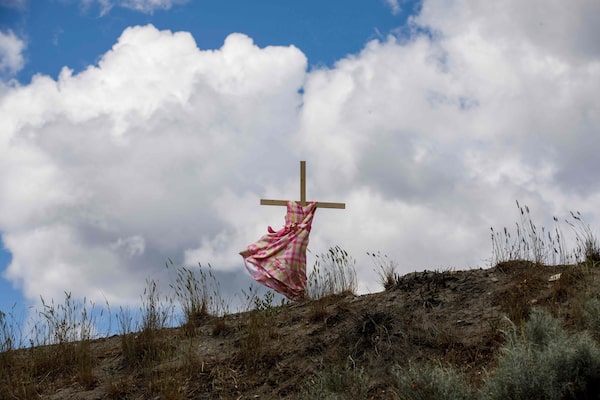
A staked child's dress blows in the wind on Highway 5, representing an ongoing genocide against First Nations people in Canada, near the former Kamloops Indian Residential School, where the remains of 215 children were discovered buried near the facility, in Kamloops.COLE BURSTON/AFP/Getty Images
Kim Echlin is a novelist. Her most recent book is Speak, Silence.
I want to tell you an old Brothers Grimm tale called The Singing Bone. In this story, a jealous man kills his younger brother and hides his body below a bridge. Some years later, a shepherd sees a white bone poking up from the sand and takes it to make into a flute. To his astonishment, when he blows into the flute, it sings a song about a murder. The shepherd takes the bone and plays it for the king, who immediately recognizes the story. He finds and punishes the murderer. Then he orders the younger brother’s bones dug up and brought back to be buried in a beautiful place. In this way, order is restored in the kingdom.
How we bury our dead is a measure of our humanity. Everywhere are rituals and memorials of stone, shell, wood and words. When we honour the dead, we knit ourselves into our past and our future. I can only know my dead from their stories. Without them, life’s fullness is impossible. In some languages the very word for “story” means “the ancestors.”
When we listen, we know.
Our world community has perpetrated so many genocides and mass killings in the past century that we needed to create the International Commission on Missing Persons. This intergovernmental group assists in locating, recovering and identifying persons who have gone missing as a result of war, natural disasters, crimes and human-rights abuses. Using large-scale DNA identification in co-operation with local governments and communities, ICMP experts work on clandestine graves and disappearances around the world. The commission began its work in the Western Balkans and has found and identified 70 per cent of an estimated 40,000 missing people in the region. Canada needs to do this work at our former residential schools.
Without the naming and proper burial of the dead, families cannot grieve and share their stories. Without these stories, we all stand on the edge of immutable darkness.
I have seen the ocean of white markers in the Srebrenica-Potocari Memorial. I have watched people in grief, honouring their loved ones at individual obelisks, each carved with a name.
I have also seen rough, handwritten signs secretly nailed to otherwise unmarked graves on Cambodian roadsides. I have visited villages where people did not dare to speak the names of their missing. Where there is denial, the people grieve in excruciating loneliness. Emptiness attaches to all our souls. The lost wander and haunt us forever.
If we listen, we know.
There is no need to ask any more about the importance of finding the dead. Witness voices from around the world have told us. We know from the women who searched the dust of Chile’s Atacama Desert for 40 years until they found the grave of their 26 men. We know from the witnesses at the Ntarama church in Rwanda. We know from the Mayans who continue to search for their missing in Guatemala. And now we know, with grief and rage, from witnesses in Kamloops, Canada. Let our voices join the pleas of others around the world: “Tell us what happened.”
Former chief justice Beverley McLachlin has said that Canada committed cultural genocide with such policies as the residential schools. Truth and Reconciliation chief commissioner Justice Murray Sinclair has pointed to Article 2 (e) of the Convention of Genocide (1951): “Forcibly transferring children of the group to another group.”
If we listen, we know.
In 3,000 BC the poets of Sumer told of how the black-headed people tried to hide a crime. The goddess brought drought and pestilence upon them. Finally, the people came to the goddess, admitted their crime and begged to be spared. The goddess insisted that judgment and punishment were not enough. She said the crime must also be written into a song so that all the generations to come would remember.
Without stories and song, no memory or future.
The Truth and Reconciliation Commission’s Call to Action #72 is the National Residential School Student Death Register. We have already agreed as a country to do this work. We must listen to each First Nations community about where and when to dig, to identify, to find out. We must do this work now. We must mark the graves and name the dead children and know their stories. Now.
The bones cry out. No reconciliation without truth. Listen.
Keep your Opinions sharp and informed. Get the Opinion newsletter. Sign up today.